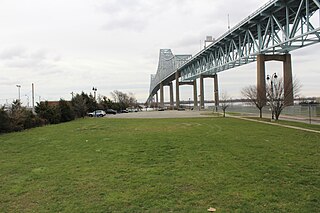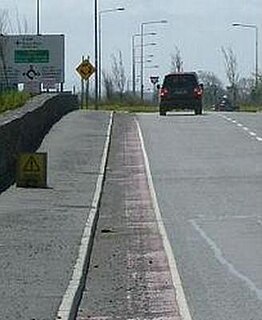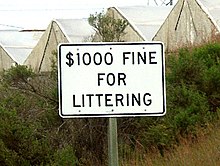Drunk driving is the act of operating a motor vehicle with the operator's ability to do so impaired as a result of alcohol consumption, or with a blood alcohol level in excess of the legal limit. For drivers 21 years or older, driving with a blood alcohol concentration (BAC) of 0.08% or higher is illegal. For drivers under 21 years old, the legal limit is lower, with state limits ranging from 0.00 to 0.02. Lower BAC limits apply when operating boats, airplanes, or commercial vehicles. Among other names, the criminal offense of drunk driving may be called driving under the influence (DUI), driving while intoxicated or impaired (DWI), operating [a] vehicle under the influence of alcohol (OVI), or operating while impaired (OWI).

Driving under the influence (DUI) is the offense of driving, operating, or being in control of a vehicle while impaired by alcohol or other drugs, to a level that renders the driver incapable of operating a motor vehicle safely.

The Oregon Bottle Bill is a container-deposit legislation enacted in the U.S. state of Oregon in 1971 that went into effect in October 1972. It was the first such legislation in the United States. It was amended in 2007 and 2011. It requires applicable beverages in applicable sizes in glass, plastic or metal cans or bottles sold in Oregon to be returnable with a minimum refund value. The refund value was initially 5 cents until April 1, 2017, when it increased to 10 cents. The Oregon Legislature has given the Oregon Liquor Control Commission the authority to administer and enforce the Bottle Bill. For COVID-19 related reasons, from March 15, 2020 until July 5, 2021 enforcement was suspended a few times and retailers were allowed to limit acceptance hours. Oregon Beverage Recycling Cooperative (OBRC), a private cooperative owned by retailers and beverage distributors administers the collection and transportation of returned containers and keeps all the unclaimed deposits. Materials from returned containers are sold by the OBRC and proceeds are handed out to beverage distributors. 2022 expansion made canned wine eligible for redemption beginning on July 1, 2025.

Litter consists of waste products that have been discarded incorrectly, without consent, at an unsuitable location. Litter can also be used as a verb; to litter means to drop and leave objects, often man-made, such as aluminum cans, paper cups, food wrappers, cardboard boxes or plastic bottles on the ground, and leave them there indefinitely or for other people to dispose of as opposed to disposing of them correctly.

Keep America Beautiful is a nonprofit organization founded in 1953. It is the largest community improvement organization in the United States, with more than 700 state and community-based affiliate organizations and more than 1,000 partner organizations.

Illegal dumping, also called fly dumping or fly tipping (UK), is the dumping of waste illegally instead of using an authorized method such as curbside collection or using an authorized rubbish dump. It is the illegal deposit of any waste onto land, including waste dumped or tipped on a site with no license to accept waste. The United States Environmental Protection Agency developed a “profile” of the typical illegal dumper. Characteristics of offenders include local residents, construction and landscaping contractors, waste removers, scrap yard operators, and automobile and tire repair shops.

Marine debris, also known as marine litter, is human-created waste that has deliberately or accidentally been released in a sea or ocean. Floating oceanic debris tends to accumulate at the center of gyres and on coastlines, frequently washing aground, when it is known as beach litter or tidewrack. Deliberate disposal of wastes at sea is called ocean dumping. Naturally occurring debris, such as driftwood and drift seeds, are also present. With the increasing use of plastic, human influence has become an issue as many types of (petrochemical) plastics do not biodegrade quickly, as would natural or organic materials. The largest single type of plastic pollution (~10 %) and majority of large plastic in the oceans is discarded and lost nets from the fishing industry. Waterborne plastic poses a serious threat to fish, seabirds, marine reptiles, and marine mammals, as well as to boats and coasts.

The Oregon Liquor and Cannabis Commission (OLCC), formerly known as Oregon Liquor Control Commission is a government agency of the U.S. state of Oregon. The OLCC was created by an act of the Oregon Legislative Assembly in 1933, days after the repeal of prohibition, as a means of providing control over the distribution, sales and consumption of alcoholic beverages. To this end, the agency was given the authority to regulate and license those who manufacture, sell or serve alcohol. Oregon is one of 18 alcoholic beverage control states that directly control the sales of alcoholic beverages in the United States. In 2014, the passage of Oregon Ballot Measure 91 (2014) legalized the recreational use of marijuana in Oregon and gave regulatory authority to the OLCC.

The Great Pacific garbage patch is a garbage patch, a gyre of marine debris particles, in the central North Pacific Ocean. It is located roughly from 135°W to 155°W and 35°N to 42°N. The collection of plastic and floating trash originates from the Pacific Rim, including countries in Asia, North America, and South America. The gyre is divided into two areas, the "Eastern Garbage Patch" from California to Hawaii, and the "Western Garbage Patch" extending from Hawaii to Japan. Despite the common public perception of the patch existing as giant islands of floating garbage, its low density prevents detection by satellite imagery, or even by casual boaters or divers in the area. This is because the patch is a widely dispersed area consisting primarily of suspended "fingernail-sized or smaller"—often microscopic—particles in the upper water column known as microplastics. Researchers from The Ocean Cleanup project claimed that the patch covers 1.6 million square kilometres. Some of the plastic in the patch is over 50 years old, and includes items such as "plastic lighters, toothbrushes, water bottles, pens, baby bottles, cell phones, plastic bags, and nurdles." The small fibers of wood pulp found throughout the patch are "believed to originate from the thousands of tons of toilet paper flushed into the oceans daily."

The Adopt-a-Highway program, and the very similar Sponsor-a-Highway, are promotional campaigns undertaken by U.S. states, provinces and territories of Canada, and some national governments outside North America to encourage volunteers to keep a section of a highway free from litter. In exchange for regular litter removal, an organization is allowed to have its name posted on a sign in the section of the highways they maintain.
Warren County PCB Landfill was a PCB landfill located in Warren County, North Carolina, near the community of Afton south of Warrenton. The landfill was created in 1982 by the State of North Carolina as a place to dump contaminated soil as result of an illegal PCB dumping incident. The site, which is about 150 acres (0.61 km2), was extremely controversial and led to years of lawsuits. Warren County was one of the first cases of environmental justice in the United States and set a legal precedent for other environmental justice cases. The site was approximately three miles south of Warrenton. The State of North Carolina owned about 19 acres (77,000 m2) of the tract where the landfill was located, and Warren County owned the surrounding acreage around the borders.

Most seat belt laws in the United States are left to the states and territories. However, the first seat belt law was a federal law, Title 49 of the United States Code, Chapter 301, Motor Safety Standard, which took effect on January 1, 1968, that required all vehicles to be fitted with seat belts in all designated seating positions. This law has since been modified to require three-point seat belts in outboard-seating positions, and finally three-point seat belts in all seating positions. Initially, seat belt use was voluntary. New York was the first state to pass a law which required vehicle occupants to wear seat belts, a law that came into effect on December 1, 1984. New Hampshire is the only state that has no enforceable laws for the wearing of seat belts in a vehicle.
The Great Canadian Shoreline Cleanup is a conservation initiative of the Ocean Wise Conservation Association and WWF-Canada. The Shoreline Cleanup encourages people across Canada to remove shoreline litter to help create healthy waters for everyone, including the wildlife and communities that depend on them.

Cannabis in Oregon is legal for both medical and recreational use. In recent decades, the U.S. state of Oregon has had a number of legislative, legal, and cultural events surrounding use of cannabis. Oregon was the first state to decriminalize the possession of small amounts of cannabis, and among the first to authorize its use for medical purposes. An attempt to recriminalize possession of small amounts of cannabis was turned down by Oregon voters in 1997.
The U.S. state of Oregon has various policies restricting the production, sale, and use of different substances. In 2006, Oregon's per capita drug use exceeded the national average. The most used substances were marijuana, methamphetamine and illicit painkillers and stimulants.

Wade Dump was a rubber recycling facility and illegal industrial waste storage and disposal facility in Chester, Pennsylvania. It was located at 1 Flower Street on the western bank of the Delaware River just north of the Commodore Barry Bridge.
Smoking bans in private vehicles are enacted to protect passengers from secondhand smoke and to increase road traffic safety, e.g. by preventing the driver from being distracted by the act of smoking. Smoking bans in private vehicles are less common than bans extended to public transport or vehicles used during work, like trucks or police cars.

Road debris, a form of road hazard, is debris on or off a road. Road debris includes substances, materials, and objects that are foreign to the normal roadway environment. Debris may be produced by vehicular or non-vehicular sources, but in all cases it is considered litter, a form of solid waste. Debris may tend to collect in areas where vehicles do not drive, such as on the edges (shoulder), around traffic islands, and junctions.

A trash interceptor is a device in a river to collect and remove floating debris – before the debris flows out into a harbor, for instance.
The Oregon Indoor Clean Air Act, also known as the Smokefree Workplace Law, is a measure passed in 1981 by the US State of Oregon prohibiting smoking in public indoor places except in certain designated smoking areas. The objective is to protect non-smokers in confined areas from second-hand smoke. Beginning on January 1, 2016, the law was extended to cover "inhalant delivery systems" such as e-cigarettes.















